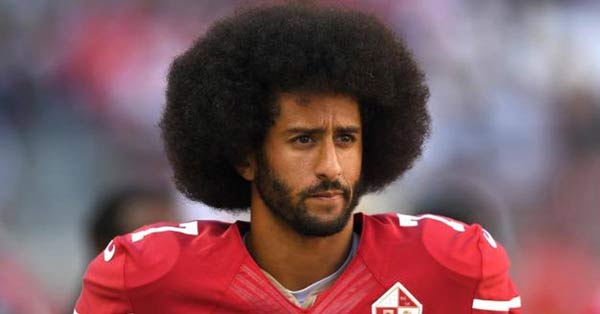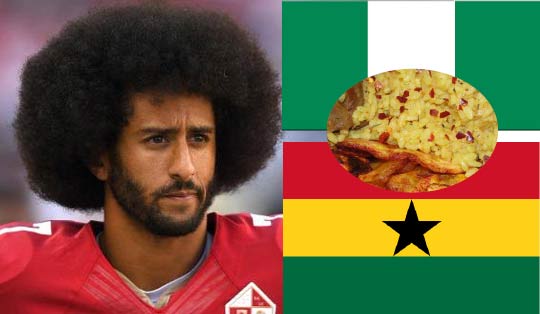Jude Ehikwe is on Twitter: @jehiks08
I am sure we all know the name Colin Kaepernick by now. His name has visited the kitchen, bedroom, living room and other rooms of all homes in America, which probably includes their basements, attics and garages as well. The 49ers football star became nationally popular for his act of kneeling during renditions of the “Star-Spangled Banner” (American national anthem) before their games – an act to bring national awareness to racial injustice and police brutality towards black men and minorities. His defiance has led to other athletes, not only in American football, but in other sports as well, kneeling or using other stances during the national anthem to show support for his cause. He has lost favor with many Americans, who argue that he should find other ways of protesting. Others insist he sticks to football and shut up.
But the man has decided not to keep quiet, and to use the media cameras (that follow him into dressing rooms to capture his beautifully combed afro) accompanied by journalists (who conveniently forget to ask him questions about the game but about his protest and non-football activities) to further raise awareness. What better way to bring attention to these vital issues? Isn’t that the point of protesting? That concludes his argument on kneeling during the anthem.
The selfless star has also put his money where his mouth is. He has donated to projects that benefit Black and Latino kids. He recently held camps in Oakland, San Francisco, Richmond and other cities throughout the Bay Area where he is promoting what is called “The Ten-Point Program” inspired by the Black Panthers Party.
I am afraid that this man’s popularity is about to take flight into Africa. Not because American football has now become a thing there – basketball is enough for now – but because Kaepernick recently released news about his ancestry. He found out, through DNA analyses that his biological father’s ancestry can be traced to Nigeria and Ghana, two countries in West Africa.
It is not at all strange that many blacks in America have ancestral ties to Africa, but when Nigeria and Ghana are put in the same sentence, it immediately draws into the equation some serious dispute and controversy. As a matter of fact, this is indeed an appeal to Kaepernick to weigh in on this issue, so that we may come closer to resolving this serious matter. It is not at the level of the cause he has dedicated himself to, but it is very important to what comes out of the kitchen of these two countries. That’s right! It is the ‘Battle of the Jollof’ – Jollof Rice.
Call it trivial or not, Jollof rice is a serious staple dish for both nationalities and has been, as observed on social media or banter between folks, a major point of contention (in jest, but not really) between people from these countries. Let me just say this; you cannot go wrong by serving a West African person Jollof rice. If they admit to not eating Jollof rice, have them immediately denounce their heritage or report them to the closest embassy of their nationality.
Come to think of it, if the whole world ate more Jollof rice, conflict around the globe would be reduced by half; the remainder will completely be wiped out if you add fried plantain. So, what is Jollof rice, you say?
The dish consists of rice, tomatoes and tomato paste, onions, salt, spices (such as nutmeg, ginger, Scotch bonnet (pepper), and cumin) and chili peppers; optional ingredients can be added such as vegetables, meat, or fish. The tomato paste and palm oil contribute to the reddish color. But there is more to the taste of Jollof rice from both the Nigerian and Ghanaian versions, that make your tongue and pallet compete for its flavoring.
The origin of the name however comes from the Senegambia region ruled by the Wolof (Jolof) empire in the 15th century. That doesn’t stop Nigerians and Ghanaians arguing over who pioneered the dish, and more importantly who makes it better. To resolve this, don’t look to me. I am usually objective, except when it comes to Nigerian food. It is in this vain that we call on to Colin Kaepernick to help us out of this quagmire. His ties to both countries and his fair and neutral position makes him a perfect candidate to weigh in on this matter.
To give him a point of reference, there is an American dish that can be called upon here. In the United States, those from the Louisiana region can probably relate more. The origin and preparation of the Jambalaya dish is heavenly influenced by Jollof rice, not only in its appearance but also in its preparation. While you can prepare Jellof rice without meat or fish, the Jambalaya dish is completely based on cooking it with meats or sea foods at the early stages. But of course, another main distinction that makes the Jollof what it is are the spices and the special proportions of each added. If you are not familiar with this dish, consult a Nigerian or a Ghanaian restaurant near you, or even better ask a Nigerian or Ghanaian friend or coworker to indulge you. You can also weigh in on the issue if you try (or have tried) both dishes – the Nigerian and the Ghanaian one.
However, there are other variations from Senegal, Gambia, Sierra Leone, Liberia, Togo, Cameroon, and Mali. But these countries usually do not come up when these two Jollof rice heavyweights go at it. So, if you know or have any links to Colin Kaepernick or anyone in the media who does, inform them about this issue. So that when he has a moment from his very serious and important advocacy for minorities and young people, we can expect a statement about his opinion after he had tried both dishes.
Nigeria and Ghana welcome you Colin Kaepernick.
Hashtag: #JollofRiceRocks!
Participate in Poll (vote and see how others are voting)



Really? … We’re being #MurderedByCops & #ICYMI #PoC in USA are The Majority’ js